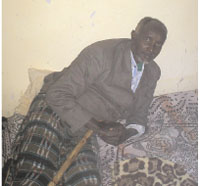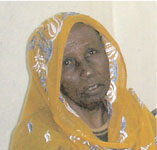
Hard times for Somali refugees in Yemen [Archives:2006/1001/Reportage]
November 23 2006
 |
 |
 |
 |
On a narrow road in Sana'a city's Safiah neighborhood, 50-year-old Ibrahim Ismail stands outside a house rented for YR 10,000 a month. He stands at the roadside gazing at passersby because he suffers paralysis and is unable to go anywhere.
After serving as a public school English teacher for nearly six years, the Yemeni government dispensed with his services. His wife and mother to three boys, Halima, affirms, “As soon as he became ill, the government suspended his salary.”
Ismail was in Taiz governorate's Sharab village one night when he fell and broke his back. “I was an English teacher, but now look at me,” he said with difficulty while gripping his walking stick.
His wife now must work day and night to sustain their family, having worked as a house cleaner ever since her husband's paralysis nine years. “I sometimes have to leave work to I take my husband to the hospital for medical treatment and examinations,” she notes.
Their three sons, Ismail, Ahmed and Abdul-Rahim, had to leave school because their mother and now disabled father can't afford their school fees. “Last year, I was in sixth grade, but now I'm at home. I really want to continue my education, but we're facing financial problems,” the eldest said, gazing forlornly at the school uniform he hasn't worn for several months.
Ismail's wife recalls that the hardest time she ever experienced was when her husband fell while walking on Sharab Mountain. “We brought him to a Sana'a hospital,” she says, “I locked my three sons – who were little at the time – at home, with no one looking after them. Imagine that I had to keep my children at home for three days. Indeed, it was a hard time for all of us,” she added.
When the Somali civil war broke out in 1991, most Somalis fled to neighboring countries like Kenya and Yemen, where they remained as refugees. In Yemen, they comprise approximately 78,000, distributed among urban areas and major cities like Sana'a, Aden and Taiz.
Most live below the poverty line, surviving via menial jobs, while some resort to begging. Others depend on support they receive from relatives who are expatriates in rich nations like the United States, the United Kingdom and the Gulf.
Yousef Adam, 54, came to Yemen 16 years ago, after war broke out in his Somali homeland. At the time, he had only five children, but he now has 15 children and three wives. “We initially arrived at a coastal refugee camp, but the harsh situation there forced us to come to Sana'a, where I took up tailoring,” Adam said.
Like other refugees, Adam's biggest problem is housing because he must rent two houses for his large family. “My family lives in two houses – one for YR 29,000 and the other for YR 13,000 per month,” he noted.
Most of his children are female and no one helps Adam bring in family income other than one of his wives, who works as a house cleaner. Due to the fluctuating nature of his job, he explains that he sometimes must search for additional work. “My job isn't stable,” he notes, “Sometimes I work and sometimes I don't. When the owner of sewing workshop refuses to give me my dues, I have to search for another job. The circle of my career goes like this.”
His wife likewise seeks daily work. “Sometimes I work, but sometimes chance doesn't favor me,” she observes.
Despite his hard times, Adam is a man of determination, taking no aid from the United Nations High Commission for Refugees (UNHCR) or any charitable organization. “He who depends on God fears nothing,” he states.
He insists on educating his children, although, “Providing school uniforms, textbooks and notebooks is difficult.”
“I like to study,” adds his 11-year-old son Mohammed, a fifth grader who's never been to his country.
Adam recalls that Yemen's 1994 secessionist war was the hardest period he ever witnessed. “We had no work and it seemed like a catastrophe to me,” he describes, “We barely had the basics, thanks to our neighbor who, gave us wheat and flour.”
Yousef Dirie, 36, was among the first Somalis to arrive in Yemen after civil war broke out in his nation. He explains that those arriving in Yemen at that time couldn't speak or understand Arabic. “That was our biggest problem because we couldn't communicate with Yemenis, who speak Arabic,” he notes.
However, having mastered the Arabic language and continued his education at Sana'a University, Dirie now is able to mix with Yemeni society.
He adds that some Somalis come to Yemen and then go on to other countries, observing, “Yemen has become an area for smuggling.”
Arriving first in Mokha with another group of Somalis, Dirie moved from one governorate to another searching for any type of work, while his colleagues managed to get into Saudi Arabia. After spending a year and a half in Sa'ada governorate, he finally settled in Sana'a city. Despite being a university graduate, Dirie depends on money he receives from relatives in the U.S.
An even more worrisome situation is when a mother must work to sustain her family, either because her husband is dead or he's working in another country. Awa Warsama, 70, arrived in Yemen two years ago to help her daughter, whose husband died six years ago. The elderly woman says her daughter arrived in Yemen 16 years ago with her husband, who was a physician. “She now works in different houses every day, sometimes making YR 800 or YR 1,000.”
Warsama's daughter was unavailable for comment because she was still at work. “She works early in the morning and returns at 9 p.m.,” her mother explained.
“We couldn't pay the house rent for six months because my daughter was sick. I remember that we couldn't cook anything for a week because we had no money – the kitchen remained quiet,” she recounted, adding that she hopes she'll be able to assist her daughter in maintaining her family.
——
[archive-e:1001-v:14-y:2006-d:2006-11-23-p:report]


